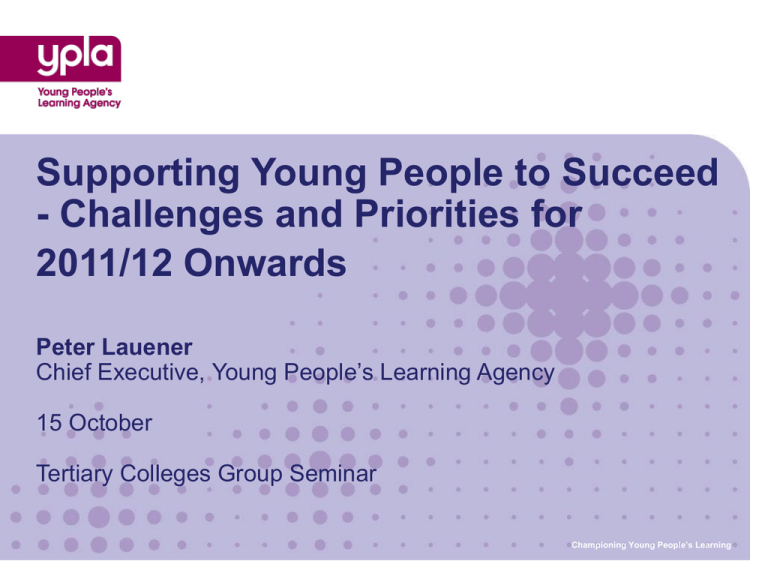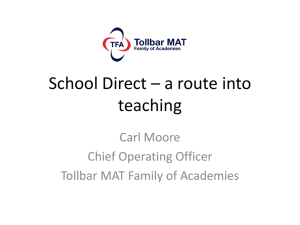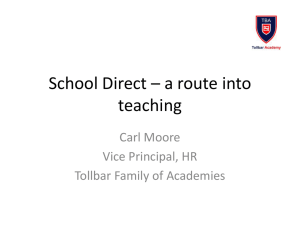Peter Lauener``s Powerpoint Presentation
advertisement

Supporting Young People to Succeed - Challenges and Priorities for 2011/12 Onwards Peter Lauener Chief Executive, Young People’s Learning Agency 15 October Tertiary Colleges Group Seminar Championing Young People’s Learning Championing Young People’s Learning Agenda today…… • YPLA Update • Young People’s Learning – what the facts tell us • Funding and Allocations for 2011/12 Championing Young People’s Learning YPLA - three roles Funding and supporting academies…… • Currently c 300 academies • Budget for 2010-11 is £1.7 billion Financial support for young learners…… • Education Maintenance Allowances for around 600,000 young people, others get support for e.g. childcare and dance and drama awards. • The budget for 2010-11 is £663m Funding learning opportunities for 16-19 year olds….. • and allocations to schools, colleges and other providers, including young offenders’ institutions. • Around 1.4 million places, costing £6.4 billion in 2010-11 Our running costs are 5 pence for every £10 that we spend Championing Young People’s Learning YPLA objectives • To deliver efficient systems for learner support • To enable independent autonomous institutions of all kinds to flourish • To support rapid growth in the number of academies • To develop a nationally consistent and transparent funding formula post 16 based on individual need and learning aims • Publish, publish, publish…….to inform market provision and individual choice Championing Young People’s Learning YPLA objectives (contd) • To support local authorities in the exercise of their local strategic role • To ensure budgetary control across all budgets and high standards of financial assurance • To minimise the overhead that the YPLA takes in its own operating costs (currently 0.5%) • To support equality of opportunity for the 2 million customers of our programmes and for our own staff Championing Young People’s Learning YPLA - Progress to date • Accurate and timely payments to academies, colleges and all types of providers • Paying 800 colleges / third sector providers directly – a change implemented in three weeks • Paying 50% more academies than we were 2 months ago – with systems for paying new academies up and running from 1 September • EMA is running smoothly – applications processed quickly with no queues • Business Plan for 2010/11 agreed and on website • Board brings cross-sector influence, expertise and commitment Championing Young People’s Learning Young people’s participation….Taking the long term view Championing Young People’s Learning Changes in Young People’s Learning over a Generation (1) Participation in learning 100 90 Proportion (%) 80 70 60 50 40 Age 16 Age 17 30 Age 18 Age 16-18 20 10 0 Year 1985 1997 2009 Championing Young People’s Learning Changes in Young People’s Learning over a Generation (2) Proportion (%) 80 70 60 50 Achievement by 15 year olds of 5 GCSEs at A*-C or equivalent Male Female Total 40 30 20 10 0 Year 1985 1997 2009 Championing Young People’s Learning Changes in Young People’s Learning over a Generation (3) Employment 45 Proportion (%) 40 35 1985 1997 2009 30 25 20 15 10 5 0 Age 16 Age 17 Age 18 Age 16-18 Championing Young People’s Learning Changes in Young People’s Learning over a Generation (4) Proportion (%) 25 20 Not in education, employment or training 1985 1997 2009 15 10 5 0 Age 16 Age 17 Age 18 Age 16-18 Championing Young People’s Learning Where 16-18 year olds study 30 25 20 15 10 5 0 Schools/ academies Independent SFC GFE WBL/ EFT HEI Championing Young People’s Learning 16-18 year olds studying at Level 3 20 18 16 14 12 10 8 6 4 2 0 A/AS school A/AS SFC A/AS GFE VQ school VQ SFC VQ GFE App WBL Championing Young People’s Learning How 16 year olds without Level 2 achieve Level 2 by 19 GCSE NVQ/VRQ Apprenticeship Level 3 Championing Young People’s Learning While participation has increased, the number disengaged has edged down but is still stubbornly high…….. Championing Young People’s Learning NEET Most young people are never NEET: most NEET episodes last fewer than six months Source: Audit Commission report: Against the Odds, July 2010 Championing Young People’s Learning Long-term effects of being NEET on young men Source: Audit Commission report: Against the Odds, July 2009 Championing Young People’s Learning Costs of disengagement A young person NEET in 2008 will cost an average of £56,000 in public finance costs before retirement age (for example, welfare payments, costs to health and criminal justice services, and loss of tax and national insurance revenue). Also £104,000 in opportunity costs (loss to the economy, welfare loss to individuals and their families, and the impact of these costs to the rest of society). The entire 2008 group of young people NEET could cost over £13 billion to the public purse and £22 billion in opportunity costs before they reach retirement age. Source: Audit Commission report: Against the Odds, July 2009 Championing Young People’s Learning So how will we now approach the allocations round for 2011/12? Championing Young People’s Learning 2011/12: Principles • Funding follows learner choice • Independent providers • Local authority leadership role, exercising strategic influence, statutory duty to secure provision • Stream lined, simplified system, reduced bureaucracy Championing Young People’s Learning 2011/12: Key features • Lagged Learner Number basis for funding • YPLA determines formula-led allocations • Additional places for growth or gap filling • No in-year or end-year adjustment if grant-funded or equivalent (for example, schools, academies, colleges) except in exceptional circumstances • Light touch in-year contract adjustment for others (for example, independent training providers, ISPs) Championing Young People’s Learning 2011/12: Roles and Responsibilities The Role of Local Authorities: • Statutory duty to secure enough suitable education and training for young people age 16-19 or up to age 25 if subject to learning difficulty assessment (ASCL duties remain unchanged) • Identifying gaps, enabling new provision, developing the market - working with YPLA to maintain control of the available budget • Local statement of priorities • Ministerial Advisory Group considering key strategic role of local authority in education and children’s services (ages 0 – 19) Championing Young People’s Learning 2011/12: Roles and Responsibilities The role of YPLA: • Data analysis and funding calculations • Funding and financial assurance of colleges and other providers • Strategic analyses of performance and participation by providers and within area Championing Young People’s Learning Allocations 2011/12: Draft Timeline November/December 2010 DfE issues grant letter confirming budget and key messages November 2010 Local authorities advise YPLA of strategic priorities for their local area January 2011 YPLA confirm to existing providers the volume of activity to be funded in 2011/12 [NB: not cash at this stage] February 2011 YPLA provides information to local authorities on aggregated provisional allocations (volumes) and confirms any additional numbers to be funded outside the lagged approach Mid March 2011 YPLA sets national base rate based on total volume of provision to be funded End March 2011 Final allocations confirmed to all providers May 2011 onwards YPLA issues funding agreements to providers for signature Championing Young People’s Learning Local Statement of Priorities • LAs lead – can be joint • Key points from strategic and local analyses and partnerships • Overall position and trends on participation; attainment and provider quality: 2-3 year horizon • Developed with 14-19 partnerships - but also a challenge to providers • Significant gaps in provision – evidence based • (If appropriate) proposals for specific structural changes eg • • • • Adding a sixth form to a school Opening/closing schools, colleges or other providers Merger or de-merger of institutions Championing Young People’s Learning Developing new specialist provision 2011/12: Funding and Contracting • The YPLA will fund directly academies, colleges, private and charitable providers, and will fund local authorities for schools with sixth forms and some other budgets (e.g. Education Business Partnerships and Young Apprenticeships) • Private Providers that deliver provision across YPLA regional borders will receive a single Contract for provision Championing Young People’s Learning 2011/12: How lagged funding works Championing Young People’s Learning Worked Example Learner Numbers F05:F01 ratio – 2009/10 LR01 return – December 2010 Data returned Ratio Learner Numbers (2010/11) A – FE College 1500 1.2 1800 B – School sixth form 400 n/a 400 School census – [November 2010] Lagged learner numbers Championing Young People’s Learning Worked Example Volume of Provision Based on historical data Learner Numbers SLN/learner ratio SLN to be funded A – FE College 1800 1.4 2520 B – School sixth form 400 1.5 600 Championing Young People’s Learning Worked Example Provider Factor Based on historical data SLN to be funded Provider factor SLN weighted by provider factor A – FE College 2520 1.15 2898 B – School sixth form 600 1.04 624 Championing Young People’s Learning Worked Example Total volumes (illustrative only – will use national figures) Total volume of learning Lagged data College A 2898 School B 624 Academy C 470 Provider D 238 New provision New Provider X 65 New Provider Y 105 Total 4230 Total volume = SLN multiplied by provider factor 170 Overall volume to be funded = 4400 Championing Young People’s Learning Worked Example National Rate (illustrative only – will use national figures) Total funding available for participation (F) Total volume of provision (V) National Rate (F/V) £12,980,000 4400 £2950/SLN Note: all figures purely illustrative! Assumes a single rate for all provision – could vary Championing Young People’s Learning Worked Example Final Allocation SLN weighted by provider factor National Rate Allocation A – FE College 2898 £2950 £8,549,100 B – School sixth form 624 £2950 £1,840,800 All figures purely illustrative Assumes a single national rate for all provision Championing Young People’s Learning Worked Example Comments • Could have a single national base rate for all provision or different rates for schools and FE as currently depending on government policy • Approach to convergence to national base rate to be agreed • Transitional protection may be required to reduce levels of turbulence Championing Young People’s Learning 19-24 LLDD • In 2011 / 12 YPLA will fund ISPs direct • Work in 201/11 to develop, model and test a new approach to bringing together the main streams of funding for learners with LDD – SEN block grant, additional learning support, funding for provision in independent specialist providers • Local authority duty to arrange learning needs assessment for young people with statement of special education needs Championing Young People’s Learning 2011/12 Allocations: Issues • Levers for local authorities • Responsiveness of the lagged approach • Addressing strategic gaps • Mergers and restructuring • Appeals Championing Young People’s Learning And finally, the big picture…….. • October 20th Spending Review results! • Education White Paper late autumn – to include conclusions on LA role • Allocations guidance to be published for consultation post White Paper • Qualification pathways and the Wolf review of vocational education • Learners with learning difficulties and disabilities and the Sarah Teather review of special needs provision. • System challenges for all partners • Continue to improve the learning offer and raise participation Narrow the gap in attainment Challenges for YPLA: Growing number of academies Supporting local authorities leadership role for 16-19 Simplifying funding for 16-19 Championing Young People’s Learning





